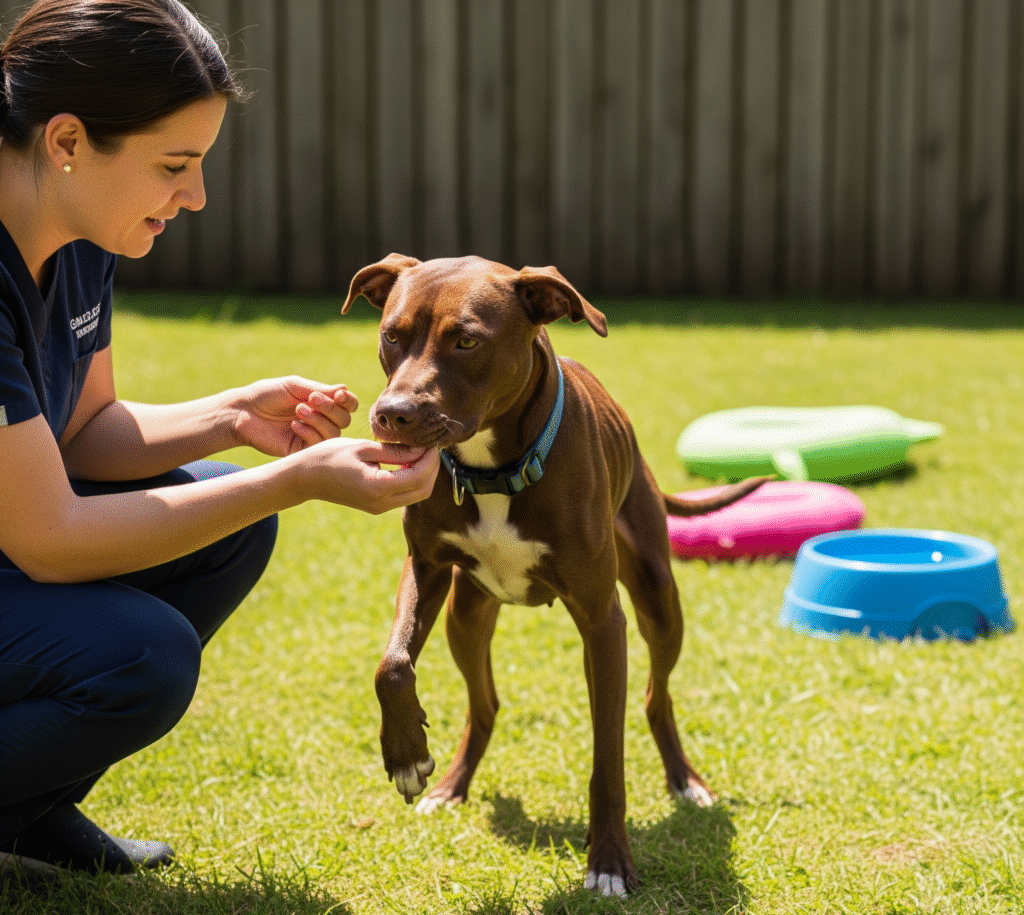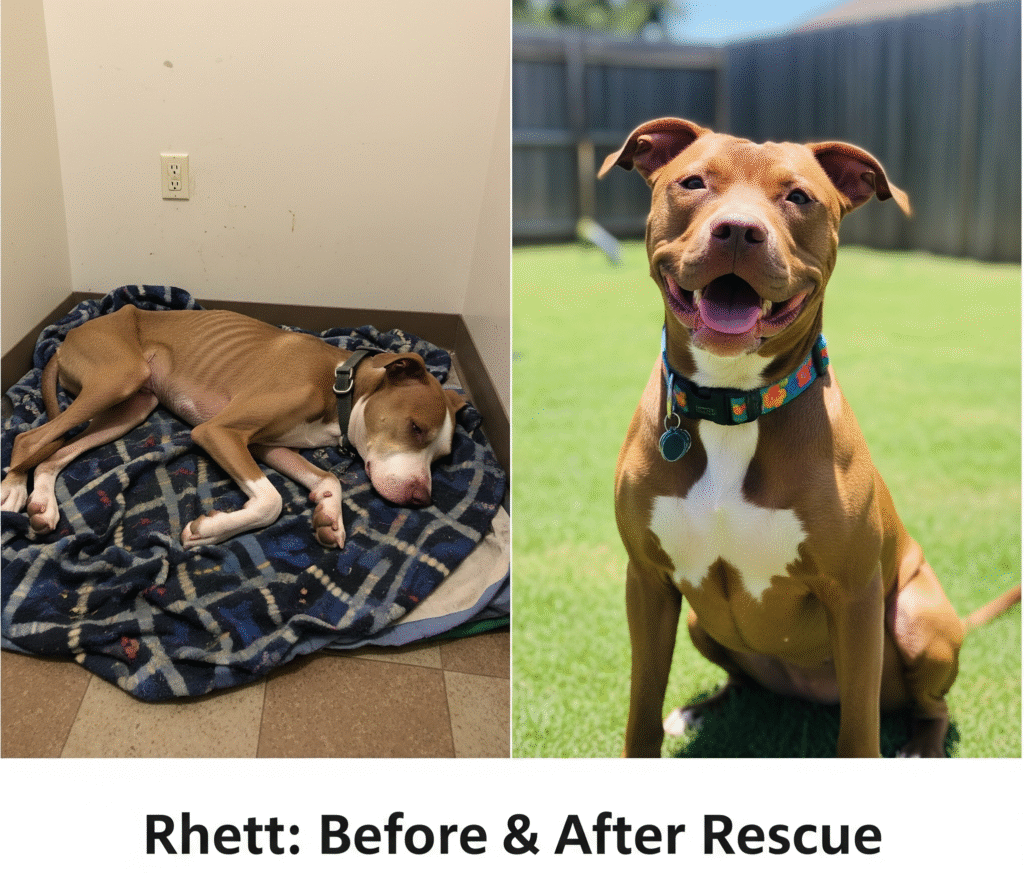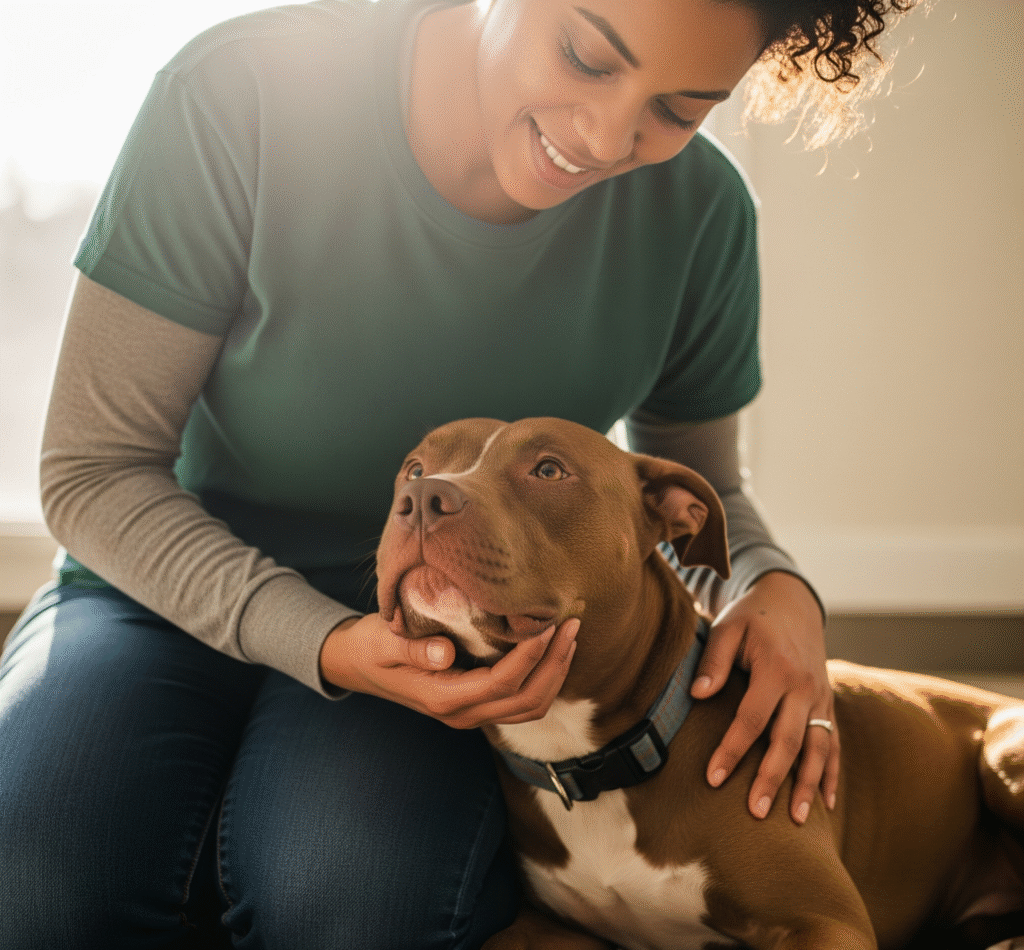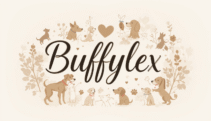Every so often, an animal’s survival against all odds reminds us of both the fragility and resilience of life. In mid‑May 2025, rescuers in Kirkland, New York, encountered one such soul: Rhett, a pit bull mix found emaciated and barely conscious in a small apartment. His ribs and spine protruded through his skin, and he was covered in fleas—an unmistakable sign of prolonged neglect. It was clear that without immediate intervention, Rhett would not survive another day.

The Moment Rhett Was Found
On May 16, 2025, first responders arrived at a rundown apartment in Kirkland, near Utica, New York. Inside, they found Rhett lying on a thin, soiled blanket. He was so weak that he couldn’t lift his head; his eyes were sunken and fearful. Dehydration had robbed him of any strength, and flea‑induced anemia had sapped almost all the blood from his veins. It was clear: Rhett was days from death.
- Physical Toll:
- Ribs and spine visibly protruding
- Severe dehydration, dry tongue
- Flea infestation causing extreme anemia
Kindred Spirits Greyhound Adoption—a local rescue group—stepped in immediately. They arranged an emergency transport to the nearest animal hospital, sparking a race against time to save this dog’s life.
A Race Against Time: Emergency Medical Care

Once Rhett arrived at Utica Animal Hospital, the veterinary team jumped into action. Blood work revealed critically low red blood cells, and his dehydration was life‑threatening. The only way forward was a canine blood transfusion—and fast.
- Immediate Actions:
- Blood Transfusion: Donated canine blood was administered within 12 hours of arrival.
- IV Fluids & Antibiotics: To reverse dehydration and fight infections from flea bites.
- Controlled Feeding: Small, nutrient‑rich meals to prevent refeeding syndrome.
- Around‑the‑Clock Monitoring:
For 48 hours straight, veterinarians and technicians kept a constant eye on Rhett’s vitals. Despite his agony, Rhett greeted each caregiver with a gentle tail wag—a heartbreaking reminder of his enduring spirit.
By May 18, two days post-rescue, Rhett managed to stand on his own—wobbly but determined. That tiny victory sparked hope in everyone watching his dog rescue story unfold.
Rehabilitation Begins: Fostering Hope

Once Rhett stabilized, Kindred Spirits placed him with a foster family. Their home became his sanctuary, where he slowly started to trust again and regain his strength:
- Physical Milestones:
- Day 7: Rhett walked a full lap around the yard, legs shaky but moving forward.
- Week 2: He gained two pounds, and his coat began to fill out.
- Week 4: Rhett enthusiastically chewed on soft toys, indicating jaw strength and renewed energy.
- Emotional Recovery:
- Trust Building: Gentle, reward‑based training helped Rhett learn that human voices and gestures meant kindness, not harm.
- Consistent Love: The foster family’s patience and affection helped him overcome deep‑seated fears from past trauma.
By early June 2025, Rhett’s eyes were bright with curiosity. He greeted visitors with a wagging tail, a far cry from the terrified dog first discovered. His journey from near‑death to a playful, loving pup illustrates exactly why every heartbreaking animal rescue story matters.
Why Rhett’s Story Resonates
- Community Vigilance Saves Lives
Without the neighbor who reported hearing Rhett’s faint whimpers, he might not have had a chance. Speaking up made all the difference, showing that a single call can spark a life‑saving rescue. - The Impact of Local Rescues
Kindred Spirits Greyhound Adoption operates on a modest budget but managed to raise over $6,000 in just one week for Rhett’s medical bills. This animal shelter fundraising success demonstrates how small groups, backed by dedicated volunteers, can create huge change. - Raising Awareness of Animal Cruelty Laws
An investigation revealed Rhett’s owner faced charges for aggravated cruelty to animals. Cases like these highlight the need for stronger enforcement and better public education on animal welfare. - Inspiring Collective Action
Rhett’s story went viral on social media—shared on Facebook, Instagram, and TikTok—encouraging thousands to donate, volunteer, or adopt. The ripple effect of one dog rescue story can save countless others.

How You Can Make a Difference
Rhett’s recovery is nothing short of miraculous, but many more animals still rely on our help. Here’s how you can support future rescues:
- Donate to Rescues and Shelters
Your contribution—big or small—helps cover veterinary bills, food, and necessary supplies. Look for organizations with transparent financials and clear missions. - Foster or Adopt
Opening your home to a dog in need frees up shelter space and gives an animal a safe place to heal. Fostering is a shorter commitment than adopting but equally life‑changing. - Share Stories on Social Media
Post Rhett’s journey (or similar heartbreaking animal rescue stories) with hashtags like #RhettRescue, #AdoptDontShop, and #SaveALife. Every share raises awareness and can spark action. - Volunteer Your Time
Shelters often need help with walking dogs, socializing cats, or assisting at adoption events. Even a few hours a month can mean the difference between life and death. - Advocate for Stronger Laws
Reach out to local representatives to support tougher penalties for animal cruelty and increased funding for animal welfare programs.

Turning Tragedy into Triumph
Rhett’s transformation—from a skeletal, flea‑infested dog to a spirited, tail‑wagging companion—embodies hope and the profound impact of community action. His heartbreaking animal rescue story is a reminder that, when we unite in compassion, we can rewrite even the bleakest endings.
If Rhett’s journey moved you, please share this blog, consider donating to your local rescue, or look into fostering an animal in need. Together, we can ensure that more dogs like Rhett get the second chance they deserve.
“Rhett’s wagging tail isn’t just a sign of his survival—it’s a call for all of us to be the voice for those who can’t speak for themselves.”

